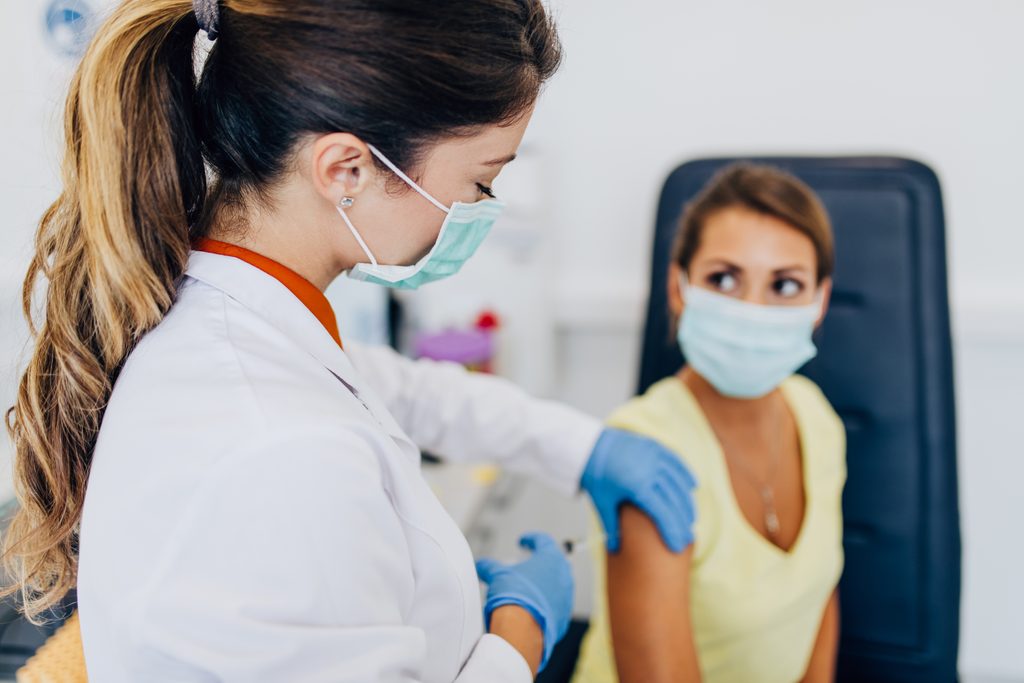This Is What It’s Like Getting the COVID Vaccine

An ER nurse from Toronto shares what it was like to be in one of the first groups vaccinated in Canada
The wait for a Covid-19 vaccine is over. Now, Canada has begun the process of rolling it out across the country, starting with frontline workers, healthcare workers, and remote Indigenous communities. Though it’s been slow going so far (as of January 18, only about 1.5 percent of the population has been immunized) the Prime Minister has announced that his goal is to have the rollout complete by September.
We talked to Mackenzie*, an emergency room nurse in Toronto about what it was like to get the Pfizer-BioNTech vaccine, and what it means to her and her colleagues to be immunized.
(Related: What Canadians Need To Know About the New COVID-19 Vaccines)
Tell me a bit about this last year, working on the front lines
It’s been difficult, there have been some unique stressors. Patients are coming in a little bit sicker than usual because they’re staying home longer rather than coming into the hospital, for example. We’re also trying to screen for travel, and COVID has an array of symptoms, so if you’re coming in with anything from a headache to diarrhea, you’re screened as potentially having COVID.
I personally haven’t experienced any burnout, but I definitely see it in the workplace. Especially for the nurses who have been working the entire pandemic, there’s a lot of stress and we’re all working lots of shifts. Plus, you don’t have the usual support systems outside of work. Like, before you could see your friends, but now a lot of people are isolated at home.
(Related: 3 Tips to Help You Cope With Covid-19 Anxiety)
When did you find out that you were getting the vaccine?
I got the vaccine through the program at the University Hospital Network in Toronto. They were mainly vaccinating long-term care workers, so I was on a waitlist. I found out pretty shortly beforehand. I think I had an hour’s notice.
Walk me through the process of getting vaccinated
I got notified that I had been moved off the waitlist, so I drove down to the hospital. And then it was just like any other normal vaccination process. I checked in, had to sign up and show them my health card, confirmed my date of birth and then I sat down with the nurse and she walked me through the process of what was going to happen and any expected signs or symptoms after. They make you stay for 15 minutes after to monitor for any potential allergic reactions. Then I booked an appointment for my second dose and was on my way!
(Related: I’m Living in a Long-Term Care Home During Covid-19 — Here’s How I’m Coping)
How did you feel when you were getting the shot?
I was really excited and relieved. I live with my parents, and working in a hospital, I am at a higher exposure. So, there’s been a fear of putting them at risk. It was definitely a weight off my shoulders, knowing that there’s that extra barrier of protection now. I have a lot of friends in nursing, so a lot of people around me also got the vaccine within the same timeframe as me and it was reassuring that I knew other people going through the same experience. I didn’t really have any fears going into it — I trust the science behind it and Health Canada’s approval process — I was just really looking forward to getting it.
Did you experience any side effects?
After the first dose, I experienced some mild side effects, which is normal for any vaccine. Mostly arm soreness and tenderness at the site. But that’s very normal. Other people might experience other side effects like having a headache. It depends on the person. With the second dose, there are some other known symptoms like body aches, headaches, chills, maybe a mild fever, but I didn’t experience them.
(Related: 14 Virtual Care Services in Canada You Need to Know About)
How do you feel now that you’re immunized?
I’m really happy that I was able to get the shot so early and I’m feeling really hopeful. It’s a sign of the next phase of the pandemic. I feel like there was a lot of anticipation during all of 2020 for the vaccine to come out, and now there’s a sense of relief and hopefulness. It’s just about finally starting this next phase of rollout and getting more people vaccinated so we can feel more hopeful for the future and see the light at the end of the tunnel, where we can go out, hug our family and friends, get that normalcy back.
*last name withheld for privacy
This interview has been edited and condensed for clarity.




